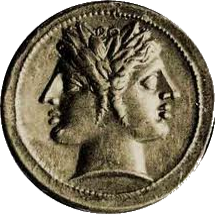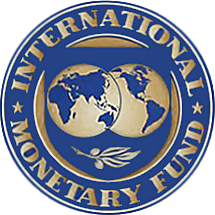Money is a medium of exchange, or token, that facilitates the trade of value beyond direct barter. Since money is a community invention used by consensus, its issuance and volume must be controlled by the community, or the nation, that uses it.
Issuance and volume are the critical elements of any money system.
Sovereign issuance ensures that it remains debt free, and limiting the volume ensures that it remains a valuable medium of exchange.
Money also serves as a unit of accounting, and it can be useful as a store of value, although a healthy money system needs its medium of exchange to circulate, remaining as liquid as possible.
It is a corruption of money to create it as debt.
- Money. In the usual and ordinary acceptation it means coins and paper currency used as circulating medium of exchange, and does not embrace notes, bonds, evidences of debt, or other personal or real estate. - Blacks Law Dictionary, Sixth Edition
“Money was intended to be used in exchange, but not to increase at interest.
And this term interest, which means the birth of money from money, is applied to the
breeding of money … of all modes of getting wealth this is the most unnatural.”
- Aristotle 325BC The Story of Philosophy, quoted by Will Durant (L.1258B4).
A money system can only function properly when the supply of money issued and circulating is kept at a stable volume. Inflating and deflating the money supply causes boom and bust cycles, both of which in a privatised system benefits the private banker, who either profits from more interest-bearing debt (boom), or profits from more foreclosures (bust).
“Whoever controls the volume of money in our country is absolute master of all industry and commerce ... and when you realize that the entire system is very easily controlled, one way or another, by a few powerful men at the top, you will not have to be told how periods of inflation and depression originate.” - James A. Garfield, assassinated president of the United States.
A sovereign nation, by definition, has the prerogative to issue its own money without debt. But throughout history sovereign nations have been enslaved by allowing their money supply to be issued by private bankers as interest-bearing debt, thereby corrupting the medium of exchange and ultimately destroying their economies.
“Once a nation parts with the control of its currency and credit, it matters not who makes the nations laws. Usury, once in control, will wreck any nation. Until the control of the issue of currency and credit is restored to government and recognised as its most sacred responsibility, all talk of the sovereignty of parliament and of democracy is idle and futile.” - William Lyon Mackenzie King.
In a debt-based economy, interest-bearing debt and deposit interest are constantly extracting unearned income from the economy. Exponential debt demands exponential productivity, which is not possible, hence the pressure to transfer productive wealth to unproductive wealth through speculation.
The cost of interest is embedded in the cost of all money and all goods and services. Interest-bearing debt functions as a hidden redistribution mechanism, constantly transferring money upward, causing growing income inequality. A money system that generates social polarization will eventually undermine any democracy.
 |
| Interest is a hidden redistribution mechanism transferring wealth upward. |
 |
| The banking cabal exercises the power of the master over the slave. |
“It’s the compounding of interest and increasing indebtedness in both the private and the public sectors that is the primary driver of economic growth. But this growth misallocates resources and prevents the emergence of a sustainable and equitable economy. Like a cancer, the political, interest-based, debt-money system destroys the environment, corrupts democratic processes, increases disparities of power and wealth, and shreds the fabric of society.” - Thomas Greco.
However, the Gold Standard did not prevent the 1929 crash and the Great Depression of the 1930's. This is because the private banking cabal was still able to restrict the volume, and therefore the velocity, of money in circulation, effectively starving the markets of liquidity, and the people of work and food.
The Great Depression was caused by market manipulation intended to precipitate the foreclosure of indebted nations, capturing wealth and power. Consequently, due to the pending bankruptcy in 1933, all privately held gold coins and bullion in America were seized via Executive Order on April 5, 1933, to benefit the false “creditor”, the private Federal Reserve Corporation under the terms of the bankruptcy. Congress - still convening strictly under Executive Order authority - confirmed the bankruptcy through the Joint Resolution to Suspend the Gold Standard and Abrogate the Gold Clause, June 5, 1933, House Joint Resolution (HJR) 192, June 5, 1933, 73rd Congress, 1st Session, Public Law 73-10. Obviously, a nation that is bankrupt, albeit falsely, is vulnerable to foreclosure by the banks. Since 1933, every central bank nation has inherited the unspoken ignominy of lost sovereignty. Therefore, every central bank government, is technically, or effectively, trading in Chapter 11 bankruptcy, and using “bankruptcy scrip” in a debt-money system.
Importantly, the private means of true payment was withdrawn on June 5, 1933, after which the people were obliged to use banker's debt-money scrip. Subsequently, on August 15, 1971, Richard Nixon closed “the gold window”, ending the ability of central bank nations to be paid for debt in gold. Consequently, since 1971, it has been impossible to “pay” our alleged collective debts within the international debt-based system. Obviously, a debt cannot be paid with another debt. There is no “payment”. It is only possible to “discharge” a debt, or to “settle” an account, with a “promise to pay”.
 |
| Debt-money is not a means of payment, but only a "promise to pay". |
 |
| 'I promise to pay the bearer on demand the sum of', or similar, was once on most paper currency. |
 |
| Pursuant to the Reserve Bank of New Zealand Act, 1933. |
 |
| Promissory note issued pursuant to the Act of 1933, the year of the "New Deal". |
Of course, the private banking cabal required “collateral” and “surety” to back their debt system.
The 1933 “bankruptcy scrip” was issued in return for Government obligations. Senate Document No. 43, 73rd Congress, 1st Session, stated that “Under the new law, the money is issued to the banks in return for Government obligations, bills of exchange, drafts, notes, trade acceptances, and bankers acceptances. The money will be worth 100 cents on the dollar, because it is backed by the credit of the nation. It will represent a mortgage on all the homes and other property of all the people in the Nation.” As a result, the real property, wealth, assets and productive labour of the people was henceforward pledged by the Government as a Surety against the national debt. This was a process of hypothecation by stealth, using the people's “commercial value”, without their consent, as collateral for the State. This “credit of the nation” has become the Surety for trade within and between all central bank nations, which collectively serve the banking administrators.
Hypothecation:
- Banking. Offer of stocks, bonds, or other assets owned by a party other than the borrower as collateral for a loan, without transferring title. If the borrower turns the property over to the lender who holds it for safekeeping, the action is referred to as a pledge. If the borrower retains possession, but gives the lender the right to sell the property in event of default, it is a true hypothecation.
- Securities. The pledging of negotiable securities to collateralize a broker’s margin loan. The broker pledges the same securities to a bank as collateral for a broker’s loan, the process is referred to as re-hypothecation.' [Dictionary Of Banking Terms, Fitch, pg. 228 (1997)
“[Very] soon, every American will be required to register their biological property in a National system designed to keep track of the people and that will operate under the ancient system of pledging. By such methodology, we can compel people to submit to our agenda, which will affect our security as a chargeback for our fiat paper currency. Every American will be forced to register or suffer not being able to work and earn a living. They will be our chattel, and we will hold the security interest over them forever, by operation of the law merchant under the scheme of secured transactions. Americans, by unknowingly or unwittingly delivering the bills of lading [Birth Certificate] to us will be rendered bankrupt and insolvent, forever to remain economic slaves through taxation, secured by their pledges. They will be stripped of their rights and given a commercial value designed to make us a profit and they will be none the wiser, for not one man in a million could ever figure our plans and, if by accident one or two would figure it out, we have in our arsenal plausible deniability. After all, this is the only logical way to fund government, by floating liens and debt to the registrants in the form of benefits and privileges. This will inevitably reap to us huge profits beyond our wildest expectations and leave every American a contributor to this fraud which we will call “Social Insurance.” Without realizing it, every American will insure us for any loss we may incur and in this manner; every American will unknowingly be our servant, however begrudgingly. The people will become helpless and without any hope for their redemption and, we will employ the high office of the President of our dummy corporation to foment this plot against America.” [Colonel Edward Mandell House to Woodrow Wilson (President 1913-1921)]
 |
| Surety for the national corporate debt. |
- Straw man. A “front”; a third party who is put up in name only to take part in a transaction. Nominal party to a transaction; one who acts as an agent for another for the purpose of taking title to real property and executing whatever documents and instruments the principal may direct respecting the property. Person who purchases property, or to accomplish some purpose otherwise not allowed. [Black's Law Dictionary, Sixth Edition, p 1421]
- Cer-tif-i-cate, noun. Middle English certificate, from Middle French, from Medieval Latin ceruficatum. from Late Latin, neuter of certificatus, past participle of certificare, to certify, 15th century. 3: a document evidencing ownership or debt. [Merriam Webster Dictionary (1998)]
- Security. 1. a: Something (as a mortgage or collateral) that is provided to make certain the fulfillment of an obligation. Example: used his property as security for a loan. l. b: "surety." 2: Evidence of indebtedness, ownership, or the right to ownership. -- Ibid.
- Bond. 1. a: A usually formal written agreement by which a person undertakes to perform a certain act (as fulfill the obligations of a contract). ... with the condition that failure to perform or abstain will obligate the person ... to pay a sum of money or will result in the forfeiture of money put up by the person or surety. 1. b: One who acts as a surety. 2: An interest-bearing document giving evidence of a debt issued by a government body or corporation that is sometimes secured by a lien on property and is often designed to take care of a particular financial need. -- Ibid.
- Surety. The person who has pledged him or herself to pay back money or perform a certain action if the principal to a contract fails, as collateral, and as part of the original contract. [Duhaime's Law Dictionary] 1: a formal engagement (as a pledge) given for the fulfillment of an undertaking. 2: one who promises to answer for the debt or default of another. Under the Uniform Commercial Code, however, a surety includes a guarantor, and the two terms are generally interchangeable. [Merriam Webster's “Dictionary of Law” (1996)]
- Guarantor. A person who pledges collateral for the contract of another, but separately, as part of an independent contract with the obligee of the original contract. [Duhaime's Law Dictionary]
The registration of birth, which creates the Birth Certificate, converts the lawful and true name of the child, into the NAME of a fictional legal “person” Trust, so that the State can obtain legal title, commercial Surety, and jurisdiction thereby. The Birth Certificate brings the NAME into colorable Admiralty Maritime Law, the same way a ship/vessel in commerce is berthed.
Since the NAME is a Trust/Estate, any living man or woman unknowingly in “joinder” to the NAME becomes “surety” for the liabilities of the Trust/Estate, as a Trustee or “accommodation party” Debtor.
Whereas every living man or woman with a publicly registered “person” Trust/Estate, is in fact a Beneficiary and a Guarantor for their nation, able to register as a Secured Party Creditor, or otherwise claim living standing as Grantor / Agent / Executor / Beneficiary / Heir to the JOHN HENRY DOE Trust/Estate.
Ultimately, money is simply “human energy” backed by Nature. It is the “water of life”; it is “charged” and “discharged”; it “flows” as “currency”; it has “liquidity” and “velocity”, and it “circulates” like blood.
When a nation, or community, surrenders its sovereign power to create money without debt or interest, a deadly economy is inevitable due to the cumulative toxic consequences of interest-bearing debt.
 |
| The cumulative toxic consequences of interest-bearing debt. |
The debt-slavery formulae is: Scarcity > Dependence > Control
 |
| Money as debt guarantees scarcity, dependence, control. |
 |
| The debt-money system is a slavery system. |
“History records that the money changers have used every form of abuse, intrigue, deceit, and violent means possible to maintain their control over governments by controlling money and its issuance.” - President James Madison.


